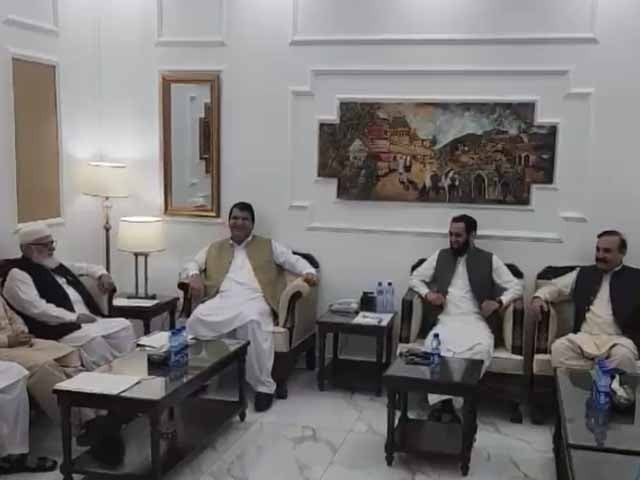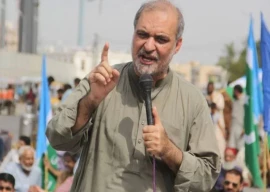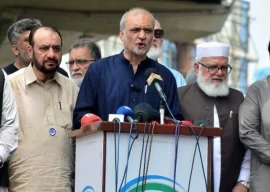
The second round of talks between the negotiation committees of the government and the Jamaat-e-Islami (JI) on Wednesday remained inconclusive yet both sides agreed to continue their dialogue on JI’s demands for ending their sit-in in Rawalpindi.
Liaquat Baloch, the head of the negotiations committee and Central Naib Amir of the JI, said that the government was serious in the negotiations, therefore, these would continue, adding that their sit-in would also continue until the demands were fully met.
For the past six days, the JI has been staging a sit-in in the Liaquat Bagh, Rawalpindi, protesting against skyrocketing electricity bills, controversial agreements with Independent Power Producers (IPPs), and rampant inflation and other public issues.
On Sunday, a government team, led by Information Minister Attaullah Tarar, met with a JI delegation. The JI team, led by Baloch, submitted a 10-point list of demands, including a 50% cut in electricity bills for consumers using up to 500 units and removal of the petroleum development levy (PDL).
After the first round of talks, the information minister had announced that the JI’s demands would be reviewed by a technical committee. He added that most of the 10 demands, pertained to electricity-related matters.
Tarar, however, did not join Wednesday’s technical-committee level talks held at the offices of the Rawalpindi commissioner. The talks continued for three hours in which detailed discussion was held on electricity prices and the exorbitant taxes, according to the committee members from both sides.
The government team included Amir Maqam, Tariq Fazal Chaudhry, the power secretary and a Federal Board of Revenue member, besides the commissioner and deputy commissioner of Rawalpindi. The JI team comprised Baloch, Amirul Azeem and Nasrullah Randhawa
During the talks, the government’s technical committee briefed the JI committee on various issues relating to the levy of taxes, including international agreements. The JI, according to Baloch, reiterated the stance that the sit-in would continue until the demands were met by the government.
Both sides agree to continue negotiations to provide relief to the people in electricity bills. It was agreed that a third round of talks would be held soon. While talking to the media after the talks, Baloch said that the government had no justification for rejecting JI’s demands.
“The second round of negotiations took place today. During the negotiations, the government committee demanded that we end our sit-in. We said that it is not possible,” Baloch told reporters. “If there was no seriousness in these negotiations, were would have ended this process today,” he added.
“The government’s committee agreed with our points. We talked about reducing the electricity tariff and charging it as per the actual cost, withdrawal of the additional burden of taxes imposed on the salaried class, and the forensic audit of the IPPs,” Baloch continued.
“They [the government’s committee] do not disagree with any of our demands. It has been stated that we will make positive progress on these. We made it clear that the sit-in will continue, we will not disappoint the people of the country,” he stated.
The JI leader warned that the people were burdened heavily and the situation was precarious. He stressed that those in power must understand the sentiments of the masses. “People should get relief,” Baloch said.
Government negotiator Amir Maqam expressed the hope that the JI sit-in would end soon, emphasising that the government also wanted to give relief to the people and it would do what it could within the available means. “We want Jamaat-e-Islami’s reservations redressed.”
Another government committee member, Dr Tariq Fazal Chaudhry, said that no minister or parliamentarian was using free electricity. He added that the prime minister had already given Rs50 billion subsidy on electricity bills.

1732020599-0/BeFunky-collage-(73)1732020599-0-165x106.webp)
1731926127-0/zayn-(1)1731926127-0-165x106.webp)
1732018399-0/BeFunky-collage-(72)1732018399-0-165x106.webp)




1732013598-0/Untitled-design-(15)1732013598-0-270x192.webp)
1732012115-0/Untitled-design-(14)1732012115-0-270x192.webp)











COMMENTS
Comments are moderated and generally will be posted if they are on-topic and not abusive.
For more information, please see our Comments FAQ